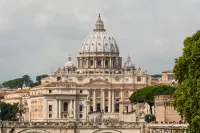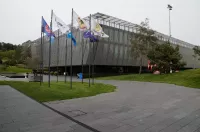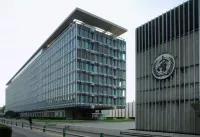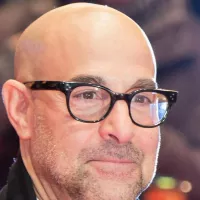Brazil is the largest country in South America, ranking fifth globally in area and seventh in population with over 213 million residents. A federation of 26 states and a Federal District (Brasília), it boasts São Paulo and Rio de Janeiro as its most populous cities. Notably, Brazil is the only country in the Americas where Portuguese is the official language, making it the world's largest Portuguese-speaking nation.
1914: Brazil's involvement in World War I begins
In 1914, Brazil began its involvement in World War I.
1915: Devastating drought
In 1915, a similarly devastating drought occurred in Brazil.
September 1922: Beginning of Radio Broadcasting
On September 7, 1922, radio broadcasting began in Brazil with a speech by then President Epitácio Pessoa.
1922: Modern Art Week
In 1922, the Modern Art Week evidenced Brazilian Modernism concerned with a nationalist avant-garde literature.
April 1923: Formalization of Radio Broadcasting
On April 20, 1923, radio broadcasting was formalized with the creation of the "Radio Society of Rio de Janeiro".
October 1930: Civilians take power
In October 1930, after an economic and military crisis, civilians took power in Brazil, remaining there until October 1930.
1930: European immigration
From 1880 to 1930, four million Europeans arrived in Brazil.
1930: Getúlio Vargas leads the Revolution of 1930
In 1930, Getúlio Vargas, supported by the military, successfully led the Revolution of 1930, after which he closed Congress, extinguished the Constitution, ruled with emergency powers, and replaced the states' governors with his own supporters.
1930: Armed revolution ends the First Republic
In 1930, an armed revolution brought an end to the First Republic in Brazil, leading to Getúlio Vargas coming to power.
1931: Release of 'Limite'
The film "Limite" was released in 1931. It was poorly received at release and failed at the box office, but is acclaimed nowadays and placed among the finest Brazilian films of all time.
1932: Constitutionalist Revolution
In 1932, the Constitutionalist Revolution, led by São Paulo's oligarchy, occurred in Brazil.
1933: Release of 'Ganga Bruta'
The film "Ganga Bruta" was released in 1933. It was poorly received at release and failed at the box office, but is acclaimed nowadays and placed among the finest Brazilian films of all time.
November 1935: Communist uprising creates a security crisis
In November 1935, a Communist uprising in Brazil created a security crisis, which resulted in Congress transferring more power to the executive branch.
1937: Getúlio Vargas assumes dictatorial powers
In 1937, Getúlio Vargas assumed dictatorial powers following a self-coup, marking the beginning of the Estado Novo in Brazil.
1937: 1937 coup d'état
In 1937, a coup d'état in Brazil resulted in the cancellation of the 1938 election and formalized Vargas as dictator, beginning the Estado Novo era.
May 1938: Putsch attempt by local fascists
In May 1938, there was a putsch attempt by local fascists in Brazil.
1940: Renewal of the Brazilian theater
In 1940, Paschoal Carlos Magno and his student's theater, the comedians group and the Italian actors Adolfo Celi, Ruggero Jacobbi and Aldo Calvo, founders of the Teatro Brasileiro de Comédia, renewed the Brazilian theater.
1940: Population growth
In the 1940s, Brazil's annual population growth rate was 2.4%, with more than half the population (54%) being illiterate.
1941: Filming of It's All True
In 1941, the unfinished film "It's All True" was divided into four segments, two of which were filmed in Brazil and directed by Orson Welles.
1945: Democracy restored after Vargas' ousting
In 1945, democracy was restored in Brazil after Getúlio Vargas was ousted from power.
1945: Vargas overthrown and democracy reinstated
In 1945, with the Allied victory, Vargas' position became untenable, and he was overthrown in another military coup, with democracy reinstated by the same army that had ended it 15 years earlier.
1945: Decline of Brazil's railway system
Since 1945, Brazil's railway system has been declining, as emphasis shifted to highway construction.
September 1950: Beginning of Television in Brazil
On September 18, 1950, television began officially in Brazil with the founding of TV Tupi by Assis Chateaubriand.
1950: Vargas returns to power by election
In 1950, Vargas returned to power by election.
1950: Annual population growth rate
In the 1950s the annual population growth rate was 3.0%.
August 1954: Vargas commits suicide amid political crisis
In August 1954, Vargas committed suicide amid a political crisis, after having returned to power by election in 1950.
1956: Juscelino Kubitschek becomes president
In 1956, Juscelino Kubitschek became president of Brazil and adopted a conciliatory stance towards the political opposition.
1960: Brasília inaugurated
In 1960, the new capital city of Brasília was inaugurated.
1960: Annual population growth rate
In the 1960s the annual population growth rate was 2.9%.
1961: Jânio Quadros resigns
In 1961, Jânio Quadros resigned less than a year after taking office as president of Brazil.
1963: São Paulo Pan American Games and FIBA Basketball World Cup
In 1963, São Paulo organized the IV Pan American Games and Brazil hosted the FIBA Basketball World Cup, winning one of its two world championship titles.
April 1964: Military coup
In April 1964, João Goulart was deposed in Brazil by a coup that resulted in a military dictatorship.
1964: Release of Black God, White Devil
Glauber Rocha's film "Black God, White Devil" was released in 1964 and is considered to be one of the greatest and most influential in Brazilian film history.
1964: Military dictatorship emerges
In 1964, an authoritarian military dictatorship emerged in Brazil with support from the United States and ruled until 1985.
1967: Release of Entranced Earth
Glauber Rocha's film "Entranced Earth" was released in 1967 and is considered to be one of the greatest and most influential in Brazilian film history.
1967: Paved roads total in Brazil
In 1967, the total of paved roads in Brazil was 35,496 km.
1968: Promulgation of the Fifth Institutional Act
In 1968, the new regime became a full dictatorship with the promulgation of the Fifth Institutional Act. Oppression extended to institutional opponents, artists, journalists, and other members of civil society.
1969: Glauber Rocha wins award
In 1969, Glauber Rocha won the Prix de la mise en scène at the Cannes Film Festival for "Antonio das Mortes".
1970: Population growth
Between 1940 and 1970, Brazil's population increased significantly due to a decline in the mortality rate, with the population growth rate remaining at 2.9% in the 1960s.
1970: Brazil's railway track length
In 1970, Brazil's total railway track length was 31,848 km.
1970: Deforestation of the Amazon Rainforest
Since 1970, the Amazon rainforest has faced significant deforestation due to economic and demographic expansion, with over 600,000 square kilometers cleared by logging.
1972: Migration to Brazil
Between 1808 and 1972, about five million people from over 60 countries migrated to Brazil.
September 1974: São Paulo Metro begins operating
On September 14, 1974, the São Paulo Metro began operating as the first underground transit system in Brazil.
1977: Glauber Rocha wins award
In 1977, Glauber Rocha won the Special Jury Prize for Best Short Film for "Di".
1978: First Car with Ethanol Engine
In 1978, the first car with an ethanol engine was produced in Brazil.
1979: Enactment of the Amnesty Law
In 1979, Brazil began a slow return to democracy with the enactment of the Amnesty Law, which was completed during the 1980s.
1985: José Sarney assumes the presidency
In 1985, José Sarney assumed the presidency of Brazil, marking the return of civilians to power.
1985: Civilian governance resumes
In 1985, civilian governance resumed in Brazil after a period of military dictatorship.
October 1988: Promulgation of the Federal Constitution
On October 5, 1988, Brazil's Federal Constitution was promulgated, serving as the fundamental law of the country.
1988: Creation of the universal health care system
In 1988, Brazil created a universal health care system.
1988: Abolishment of Federal Territories
In 1988, Brazil's Constitution abolished the last three federal territories: Amapá, Roraima, and Fernando de Noronha.
1988: Enactment of Brazil's current constitution
In 1988, Brazil's current constitution was enacted, defining the country as a democratic federal republic.
1989: Election of Fernando Collor
In 1989, Fernando Collor was elected president of Brazil.
1990: Forest cover
In 1990, forest cover was around 588,898,000 hectares (ha)
1992: Collor impeached by the National Congress
In 1992, President Collor was impeached by the National Congress in Brazil.
1994: Cardoso devises Plano Real and wins election
In 1994, Fernando Henrique Cardoso devised the Plano Real, which stabilized the Brazilian economy. Cardoso also won the 1994 election.
1995: O Quatrilho Nomination
In 1995, the film O Quatrilho (Fábio Barreto) was nominated for the Academy Award for Best Foreign Language Film.
1997: O Que É Isso, Companheiro? Nomination
In 1997, the film O Que É Isso, Companheiro? (Bruno Barreto) was nominated for the Academy Award for Best Foreign Language Film.
1998: Cardoso wins re-election
In 1998, Cardoso won the election again in Brazil.
1998: Central do Brasil Nomination
In 1998, the film Central do Brasil (Walter Salles) was nominated for the Academy Award for Best Foreign Language Film, with Fernanda Montenegro receiving a Best Actress nomination.
2000: Ranking of the Brazilian health system
In 2000, the Brazilian health system was ranked 125th among the 191 countries evaluated by the World Health Organization (WHO).
2002: Luiz Inácio Lula da Silva elected president
In 2002, Luiz Inácio Lula da Silva was elected president of Brazil.
2002: City of God Release
In 2002, the crime film City of God, directed by Fernando Meirelles, was released and received critical acclaim.
2002: Sign language law
In 2002, the sign language law in Brazil required government authorities and public agencies to accept and provide information in LIBRAS (Brazilian Sign Language).
2004: City of God Academy Award Nominations
In 2004, City of God received four Academy Award nominations, including Best Director.
2005: Presidential edict extends sign language law
A 2005 presidential edict in Brazil extended the 2002 sign language law to require the teaching of LIBRAS as part of education and speech and language pathology curricula.
2005: NDC target
Brazil sets a goal to cut greenhouse emissions by 59% to 67% compared to 2005 levels by 2035
2005: Domestic Tourism Statistics
In 2005, 51 million Brazilian nationals made ten times more trips than foreign tourists and spent five times more money, with main trip purposes being visiting friends and family (53.1%), sun and beach (40.8%), and cultural tourism (12.5%).
2005: Number of uncontacted tribes
In 2005, the National Indian Foundation estimated that Brazil has 40 different uncontacted tribes.
2005: First Airplane Engine Running on Ethanol
In 2005, the first airplane engine running on ethanol was created in Brazil.
2006: Brazil becomes self-sufficient in oil
In 2006, Brazil achieved self-sufficiency in oil, marking a significant reduction in its dependence on imported oil.
2006: Lula re-elected
In 2006, Luiz Inácio Lula da Silva was re-elected as president of Brazil.
2007: Brazil becomes self-sufficient in oil
In 2007, Brazil achieved self-sufficiency in oil, marking a significant reduction in its dependence on imported oil.
2007: Rio de Janeiro Pan American Games
In 2007, Rio de Janeiro hosted the XV Pan American Games.
2007: Life expectancy
In 2007, life expectancy in Brazil rose to 72.6 years.
2007: Privatization of the Federal Railroad Network Corporation
In 2007, the Federal Railroad Network Corporation (RFFSA), which owned most of Brazil's railway system, was privatized.
2007: Number of uncontacted tribes
In 2007, the National Indian Foundation estimated that Brazil has 67 different uncontacted tribes.
2008: Tourism Revenue Recovery
In 2008, Brazil experienced an economic crisis that affected its tourism revenue.
2008: Brazil's population
In 2008, Brazil's population was approximately 190 million, with a density of 22.31 inhabitants per square kilometer and 83.75% defined as urban.
2008: Illiteracy rate
In 2008, the illiteracy rate in Brazil was 11.48%.
October 2009: Agreement with the Vatican approved
In October 2009, the Brazilian Senate approved an agreement with the Vatican, later enacted in February 2010, recognizing the Legal Statute of the Catholic Church in Brazil.
October 2009: Rio de Janeiro Selected to Host 2016 Olympic Games
On October 2, 2009, Rio de Janeiro was selected to host the 2016 Olympic Games and 2016 Paralympic Games.
2009: Global Information Technology Report Ranking
According to the Global Information Technology Report 2009–2010, Brazil was the world's 61st largest developer of information technology.
2009: Mobile Phone and Internet Use
By 2009, the mobile phone and Internet use in Brazil was the fifth largest in the world.
2009: Tourism Revenue Recovery
In 2009, Brazil experienced an economic crisis that affected its tourism revenue.
February 2010: Agreement with the Vatican enacted
In February 2010, the President of Brazil enacted an agreement with the Vatican, which was approved by the Brazilian Senate in October 2009, recognizing the Legal Statute of the Catholic Church in Brazil.
May 2010: Launch of TV Brasil Internacional
In May 2010, the Brazilian government launched TV Brasil Internacional, an international television station.
2010: Irreligious population
According to the 2010 census, individuals professing no religion exceeded 8% of the population in Brazil.
2010: Global Information Technology Report Ranking
According to the Global Information Technology Report 2009–2010, Brazil was the world's 61st largest developer of information technology.
2010: Protestant community growth
By 2010, the Protestant community in Brazil had grown to include over 22% of the population.
2010: Tourism Revenue Recovery
In 2010, Brazil's revenues from international tourists reached US$6 billion, recovering from the 2008-2009 economic crisis.
2010: Dilma Rousseff elected president
In 2010, Dilma Rousseff won election as president of Brazil.
2011: Tourism Records
In 2011, Brazil reached historical records of 5.4 million visitors and US$6.8 billion in tourism receipts.
May 2013: Nationwide Marriage Rights for Same-Sex Couples
In May 2013, same-sex couples in Brazil gained nationwide marriage rights.
2013: Textile Industry
In 2013, Brazil's textile industry was among the five largest world producers, however it is very little integrated into world trade.
2014: Brazil's Economic Recession
In 2014, Brazil entered a recession amid a political corruption scandal and nationwide protests.
2014: Rousseff wins re-election
In 2014, Dilma Rousseff won the election again in Brazil.
2015: Forest ownership
In 2015, 56% of the forest area was reported to be under public ownership and 44% private ownership.
2015: International Tourist Arrivals in Brazil
In 2015, Brazil had 6.36 million visitors, ranking as the main destination in South America and second in Latin America after Mexico.
2015: Brazil's railway track length
In 2015, Brazil's total railway track length was 30,576 km, making it the ninth largest network in the world.
2016: Camões Prize recipients
As of 2016, Brazil has eleven recipients of the Camões Prize, which is shared with the rest of the Portuguese-speaking world.
2016: Pulp and Paper Production Ranking
In 2016, Brazil was the second-largest producer of pulp and the eighth-largest producer of paper worldwide.
2016: Rousseff impeached by Brazilian Congress
In 2016, Dilma Rousseff was impeached by the Brazilian Congress. Michel Temer assumed full presidential powers on August 31 after the impeachment was accepted.
2016: Rio de Janeiro Olympic Games
In 2016, Rio de Janeiro hosted the Olympic Games and Paralympic Games.
2017: Homicide Rate Peak in Brazil
In 2017, Brazil recorded a record 63,880 homicides.
2017: Land Use in Brazil
In 2017, native vegetation covered 61% of Brazil's territory, agriculture used 8%, and pastures occupied 19.7%.
2017: Supreme Court requests investigation of lawmakers
In 2017, the Supreme Court requested the investigation of 71 Brazilian lawmakers and nine ministers of President Michel Temer's cabinet who were allegedly linked to the Petrobras corruption scandal. President Temer was also accused of corruption.
2017: Freedom House Report on Brazil
The 2017 Freedom in the World report by Freedom House gave Brazil a score of "2" for both political rights and civil liberties.
2018: World Tourist Destinations Ranking
In 2018, Brazil was the 48th most visited country in the world, with 6.6 million tourists and revenues of 5.9 billion dollars.
2018: Jair Bolsonaro elected president
In 2018, Jair Bolsonaro was elected president of Brazil.
2018: Brazilian Chemical Industry Ranking
In 2018, the chemical industry of Brazil was the eighth-largest in the world.
2018: Tertiary Sector Contribution to GDP
In 2018, the tertiary sector (trade and services) represented 75.8% of Brazil's GDP, with the service sector accounting for 60% and trade for 13%.
2018: Paved roads total in Brazil
In 2018, the total of paved roads in Brazil was 215,000 km.
2019: 2019 Copa América
In 2019, Brazil hosted the Copa América.
2019: Global Innovation Index Ranking
In 2019, Brazil was ranked 66th in the Global Innovation Index.
2019: Brazil's Processed Foods Export
In 2019, Brazil was the second-largest exporter of processed foods in the world.
2019: Renewable Energy Matrix
In 2019, Brazil's energy matrix was 45% renewable, compared to the world average of 14%.
2019: Brazil's renewable electric energy
In 2019, Brazil's renewable electric energy was at 83%, significantly higher than the world average of 25%.
2019: Brazilian road system total length
In 2019, Brazil's road system totaled 1,720,000 km, serving as the primary carriers of freight and passenger traffic.
2019: Constitutional Amendment No. 104
In 2019, Constitutional Amendment No. 104 in Brazil established the Federal, District, and State Penal Police within the law enforcement structure.
2019: Comparison of Forest Areas in Europe and Brazil
In 2019, forests covered 43% of Europe, but only 3% was native forest, highlighting Brazil's interest in conservation due to its agriculture sector's dependence on forests.
2019: Literacy rate
In 2019, the literacy rate in Brazil was 93.4%, with 11.3 million people still illiterate and functional illiteracy reaching 21.6% of the population.
2020: Forest cover
In 2020, forest cover is around 59% of the total land area, equivalent to 496,619,600 hectares (ha) of forest
May 2021: Luiz Inácio Lula da Silva announces candidacy
In May 2021, Luiz Inácio Lula da Silva stated that he would run for a third term in the 2022 Brazilian general election against Bolsonaro.
2021: Brazil's Trade Ranking
As of 2021, Brazil was the world's 24th-largest exporter and 26th-largest importer.
2021: Installed Renewable Power Capacity
At the end of 2021, Brazil ranked 2nd globally in installed hydroelectric (109.4 GW) and biomass (15.8 GW) power, 7th in wind power (21.1 GW), and 14th in solar power (13.0 GW).
2021: Brazil's electricity sector capacity
By the end of 2021, Brazil's electricity sector capacity was 181,532 MW, making it the largest in Latin America.
2021: Brazil as 7th oil producer
In 2021, Brazil became the 7th largest oil producer in the world, with an average production of nearly three million barrels per day, enabling the country to export oil.
2021: Doctors and Hospital Beds
In 2021, Brazil had 2.1 doctors and 2.5 hospital beds for every 1,000 inhabitants.
2021: 2021 Copa América
In 2021, Brazil hosted the Copa América.
July 2022: Amendments to the Federal Constitution
As of July 2022, there have been 124 amendments to Brazil's Federal Constitution.
October 2022: Lula wins the election
In October 2022, Lula was in first place in the first round, with 48.43% of the support from the electorate, and received 50.90% of the votes in the second round.
2022: Brazilian census
According to the 2022 Brazilian census, 45.3% of the population described themselves as Pardo, 43.5% as White, 10.2% as Black, 0.6% as Indigenous and 0.4% as East Asian.
2022: Demographic Census on Religion
According to the 2022 demographic census, 56.75% of the Brazilian population followed Catholicism; 26.85% Protestantism; 1.84% Kardecist spiritism; 5.06% other religions, undeclared or undetermined; while 9.28% had no religion.
2022: Brazil's Navy Operations
As of 2022, Brazil's navy is the only one in Latin America that operates a helicopter carrier, the NAM Atlântico.
2022: Annual losses from extreme weather events
Extreme weather events like droughts and flash floods are causing annual losses of around R$13 billion (US$2.6 billion), equivalent to 0.1% of the country's 2022 GDP
2022: Evangelical Protestant influence
In 2022, Evangelical Protestant influence has been implicated in the Brazilian coup plot. Since 2022, Evangelicals and Catholics have begun reconsidering religion as a political factor.
2022: Homicide Rate Estimated by UNODC
In 2022, the United Nations Office on Drugs and Crime (UNODC) estimated an intentional homicide rate of 21.1 per 100,000 inhabitants in Brazil.
2022: Illiteracy rate
In 2022, the illiteracy rate in Brazil was roughly 7%.
January 2023: Attack on Brazil's federal government buildings
On 8 January 2023, a week after Lula's inauguration, a mob of Bolsonaro's supporters attacked Brazil's federal government buildings in the capital, Brasília, after several weeks of unrest.
2023: Homicides in Sao Paulo
In 2023, São Paulo registered a homicide rate of 6.4 per 100,000 inhabitants, while Amapá's rate was 57.4 per 100,000 inhabitants.
2023: High infant and maternal mortality rates
In 2023, infant (2.51%) and maternal mortality rates (197.3 deaths per 100,000 births) were still high in Brazil.
2023: Main Destination States for Tourism
In 2023, the main destination states in Brazil for tourism were São Paulo, Rio de Janeiro, and Rio Grande do Sul, with São Paulo state being the main source of tourists for the entire country.
2024: Brazil as Electoral Democracy
According to the Regimes of the World classification, Brazil was an electoral democracy in 2024.
2024: Wind and Solar Energy Production Ranking
At the end of 2024, Brazil was the 4th largest producer of wind energy in the world (107.8 TWh) and the 5th largest producer of solar energy in the world (74.7 TWh).
2024: Brazil revised its Nationally Determined Contribution (NDC)
In 2024 Brazil revised its Nationally Determined Contribution (NDC), setting a goal to cut greenhouse emissions by 59% to 67% compared to 2005 levels by 2035.
2024: Prison Population
In 2024, Brazil had the third-largest prison population in the world, with approximately 909,067 prisoners.
2024: Travel and Tourism Competitiveness Index Ranking
In 2024, Brazil ranked 26th worldwide in the Travel and Tourism Competitiveness Index (TTCI), third in the Americas.
2024: Homicides Recorded in Brazil
In 2024, Brazil recorded 38,772 homicides, down from 40,768 in 2023, with a national homicide rate of 17.9 per 100,000 inhabitants, the lowest in over a decade.
2024: Brazil's Economy Shows Significant Growth
In 2024, Brazil's economy began showing consistent significant growth after a period of recession.
2024: Strongest drought in Brazil since the 1950s
In 2024, for the first time, "a drought has covered all the way from the North to the country's Southeast". It is the strongest drought in Brazil since the beginning of measurement in the 1950s, covering almost 60% of the country's territory.
May 2025: The Secret Agent Premiere and Awards
On May 18, 2025, The Secret Agent had its world premiere at the Cannes Film Festival, where it won the Best Actor prize for Wagner Moura, the Best Director prize for Mendonça, and the FIPRESCI Prize.
July 2025: Brazil's estimated population
According to projections, Brazil's estimated population on July 1, 2025, was 213,421,037.
2025: Internet Penetration
As of early 2025, internet penetration in Brazil stood at 86.2% of the total population (183 million individuals), and the ratio of cellular mobile connections to the total population was 102% (217 million active connections).
2025: United Nations Climate Change Conference
In 2025 Brazil hosted the United Nations Climate Change Conference, in which it launched the Global carbon market coalition immediately joined by 11 countries including Brazil, China, the European Union, United Kingdom
2025: Global Innovation Index Ranking
In 2025, Brazil was ranked 52nd in the Global Innovation Index, up from 66th in 2019.
2029: Launch of Brazil's First Nuclear Submarine
Brazil's first nuclear submarine is expected to be launched in 2029.
2035: NDC target
Brazil sets a goal to cut greenhouse emissions by 59% to 67% compared to 2005 levels by 2035
2050: Expected population growth rate
By 2050, Brazil's population growth rate is expected to fall to a negative value of –0.29%.
2060: Target of reaching carbon neutrality by 2060
Brazil has an indicative target of reaching carbon neutrality by 2060 if the country receives 10 billion dollars per year.
Mentioned in this timeline

Basketball is a team sport played on a rectangular court...

A submarine is a watercraft capable of independent operation underwater...
Germany officially the Federal Republic of Germany is a nation...

The Catholic Church the largest Christian church globally with over...

FIFA the F d ration Internationale de Football Association is...

The World Health Organization WHO is a specialized agency of...
Trending

29 minutes ago Hilary Knight criticizes Trump's White House invite as distasteful and reacts to Trump's joke.

5 months ago Jon Hamm: From Mad Men to a Beloved Actor

29 minutes ago Dolly Parton Praises 'Son of Jolene,' Sequel to Iconic Hit 'Jolene' Released
16 hours ago IonQ Stock Surges After Earnings Beat; Optimistic 2026 Revenue Forecast Released.
30 minutes ago Eva Marcille Hints at Possible Return to RHOA: 'Never Say Never'

1 hour ago Brooks Koepka aims to contend at PGA Tour's Cognizant Classic after comeback.
Popular

Jesse Jackson is an American civil rights activist politician and...

Susan Rice is an American diplomat and public official prominent...

Barack Obama the th U S President - was the...

XXXTentacion born Jahseh Dwayne Ricardo Onfroy was a controversial yet...

Michael Joseph Jackson the King of Pop was a highly...

Michael Jordan widely considered one of basketball's greatest players significantly...